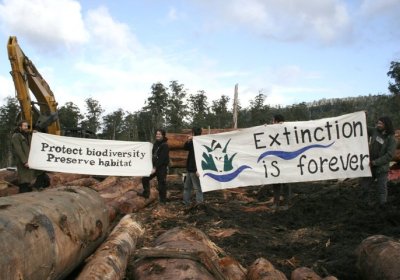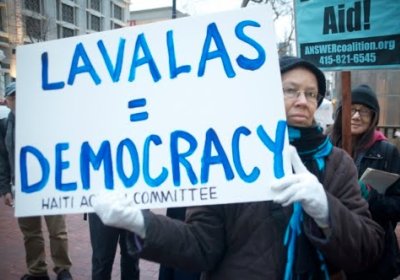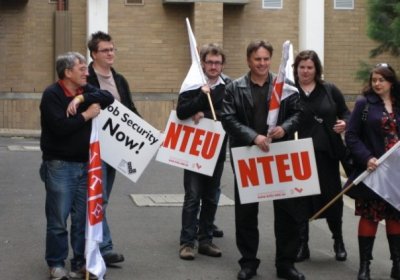863
A Socialist Alliance statement on the ‘Tasmanian Forests Statement of Principles’
***
Since its inception in 2001, the Socialist Alliance has been actively involved in campaigns to protect high conservation native forests from being logged and we support an end to the forestry conflict in Tasmania.
Haiti's November 28 election was marred by widespread fraud. Despite the call of all the leading candidates but one to cancel the exercise, officials with the UN Security Council mission as well as the United States, Canada and Europe are voicing satisfaction with the result and urging the country’s electoral commission to press ahead with a second-round runoff vote in January.
Sombat Boonngamanong is a long-time NGO activist in Thailand and has been of great help to renewing public Red Shirt activity following the bloody April-May military crackdown.
Lee Yu Kyung spoke to him about the prospects for the democracy movement in Thailand.
* * *
The streets of Ayala, the old financial capital of Manila, were taken over by about 5000 people on November 25 in a protest against the growing use of contract labour. Philippine Airlines, owned by the Philippines second richest man, is the latest company to sack its workforce and rehire them as contract workers – with lower wages and without the benefits and security guaranteed to formal, permanent workers.
About 150 members of the National Tertiary Education Union (NTEU) at the University of New South Wales and Macquarie University have been stood down after taking part in lawful and protected industrial action.
The union put a ban on the transmission of student results after more than two years of negotiations failed to make progress on improving job security, pay and other conditions for staff. A key sticking point in the negotiations is management’s unregulated use of fixed-term contracts and casual employment.
Irish election officials said on November 26 that Sinn Fein candidate Pearse Doherty had won a long-awaited by-election in Donegal with an overwhelming 40% of the vote.
The election was blocked for months before it was forced on Prime Minister Brian Cowen by the Irish courts.
Cowen faces a struggle to win votes on raising taxes and cutting spending when the 2011 budget is unveiled in parliament on December 7.
It should come as no surprise that Latin America, a region converted into a laboratory for ongoing experiments in social change, has increasingly become the topic of discussion and debate among the broader left.
The Independent Education Union (IEU) has launched a campaign for pay equity for early childhood teachers. In the months leading up to the NSW elections in March 2011, the campaign will include rallies, postcards and an email bombardment of the Labor and Liberal parties.
Early childhood teachers working in community-based preschools and childcare centres earn up to 20% less than teachers working in state government preschools and independent and Catholic primary schools.
A full-time early childhood teacher can earn $14,000 a year less than other teachers.
A rising tide of homophobic aggression in Uganda has divided religious leaders. At the root of the problem, Western missionaries have been spreading anti-gay sentiment and dividing the community.
Homosexuality has been illegal in Uganda since British colonisation in the late 19th century. However, many Ugandans trace the current crisis to March 5, 2009, when right-wing evangelical missionaries from the US held a three-day conference at the Triangle Hotel in Kampala.
On October 23, the Age reported that increased alcohol prices are driving many young people to switch to the party drug ecstasy, according to drug researchers, nightclub owners and young people themselves.
“It is cheaper and convenient to use pills”, said Professor Jake Najman, director of the University of Queensland’s Alcohol and Drug Research and Education Centre. “A lot of young people are making that choice to switch between alcohol and ecstasy. Pills can be cheaper, there is no question.”
Workers with disabilities are speaking out against the Supported Wage System (SWS), which encourages employers to legally underpay workers with disabilities.
The federal government’s Job Access program markets SWS as a progressive innovation by burying it among more egalitarian policies such as funding improvements to workplace accessibility.
The Job Access website says the SWS is “a process that allows employers to pay less than the award wage by matching a person's productivity with a fair wage”.
- Page 1
- Next page









